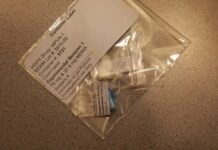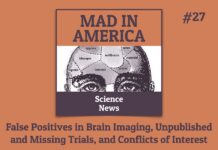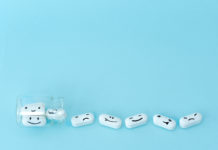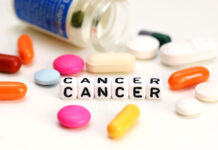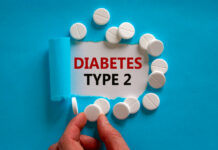Is ADHD Diagnosis Flawed? Younger Classmates More Likely to Be Diagnosed
From Sociology Lens: If ADHD is a genetically determined neurobiological disorder, a child’s birthdate, gender and other factors should have no bearing on their chances of ‘having’ it.
The Poetics and Politics of Our Mental Health Metaphors: An Interview with Laurence Kirmayer
Ayurdhi Dhar interviews influential cultural psychiatrist Laurence Kirmayer on how metaphors, histories, and social structures contour our experiences of suffering and healing.
Welcome to Planet Psychiatry
With the leadership of industry and their cosseted, lapdog doctors, psychiatric medications are prescribed indiscriminately to nearly anyone entering a physician’s office with a psychological complaint.
Why Do Only Some People Experience Severe Antidepressant Withdrawal?
Much of the vulnerability to antidepressant withdrawal may be related not to bipolar disorder, but a trait called “bipolarity.”
The Dividing Line Between Crazy and Not Crazy | Daniel Mackler
From Wild Truth: Being in touch with reality means seeing things clearly, without the veils or filters known as defenses. Thus, we’re all crazy to some degree, to the degree that we have defenses.
FDA Panel Rejects MDMA-Aided Therapy for PTSD
From The New York Times: An independent group of experts expressed concerns that the data from clinical trials did not outweigh risks for treatment of post-traumatic stress disorder.
Pair of Reports Guide Trauma-Informed Care in Child Health Systems
From the American Academy of Pediatrics: Both documents emphasize the power of safe, secure, nurturing relationships — referred to as relational health — to mitigate the effects of potentially traumatic experiences and promote resilience.
Bodily Autonomy: Busting 7 Myths That Undermine Individual Rights & Freedoms
From United Nations Population Fund: The 2021 State of World Population report, titled My Body is My Own, marks the first time a United Nations report focuses on the power and agency of individuals to make choices about their bodies without fear, violence or coercion.
“A Dangerous Substance”: The Impact of Social Media on Youth Mental Health
This is what social media does, she says. It draws people in. It hurts people. In the worst cases, it kills people.
White Paper Presents Case Against Forced Treatment
"I see the white paper as the culmination of my 40+ years of advocacy for people subjected to psychiatric incarceration and forced drugging."
False Positives in Brain Imaging, Unpublished and Missing Trials, and Conflicts of Interest
In our Science News podcast, Peter Simons reports on false positives in brain imaging, unpublished and missing trials, conflicts of interest and more.
A Call for Comfort Brought the Police Instead. Now the Solution Is in Danger
From KFF Health News: "Overcome by worries, Lynette Isbell dialed a mental health hotline in April 2022. She wanted to talk to someone about...
Beyond Drugs: The Universal Experience of Addiction | Gabor Maté, MD
From drgabormate.com: Most addicted people use no drugs at all, and addiction cannot be understood if we restrict our vision of it to substances, legal or illicit.
Cochrane Review Calls for More Research on Antidepressant Withdrawal
Researchers find a lack of current literature on safe, effective ways to manage antidepressant withdrawal and make suggestions for future research.
Critical Psychiatry Textbook, Chapter 7: Psychosis (Part Three)
Peter Gøtzsche discusses the lack of evidence for benefit, and the evidence of harms, of psychosis drugs used for early intervention/first-episode psychosis.
Cancer Risk Higher for Those on Clozapine
The antipsychotic clozapine, considered the “gold-standard” treatment for psychosis, was found to increase the risk of blood and lymph system cancers.
Peer Respite: Why It Should be Everyone’s Concern
My intent with this blog is to compare some lessons learned from my recent medical crisis response to a similar peer-run respite response.
Trauma Responses Are Conditioned, Not “Chosen”
From Dr. Glenn Doyle: From our nervous system’s point of view, if it had to wait around for us to think about everything that happens to us or "choose" a response, we’d have been eaten by sabre tooth tigers eons ago.
An American History of Addiction, Part 10: My Strange Path to Recovery
Every drinking “experiment” I performed was already tainted. Every time I would try, I became angry and resentful, feeling like I had been tricked into joining a cult.
The Emperor’s New Clothes: The Upcoming NICE Depression Guidelines
The new NICE depression guideline is a reflection of the field: you don’t really know what you’re doing, and you lack confidence that it’s doing any good.
Insane Medicine, Chapter 8: Treatment Traps and How to Get Out of Them (Part...
Sami Timimi provides a discussion of the ways medication may be helpful for some, and advice and information on discontinuing psychiatric drugs.
The Transformative Potential of Psychosis
For some, myself included, the “psychosis” became a catalyst for greater connection to self, others, and a sense of purpose.
New Study Links Antidepressants to Increased Risk of Diabetes
Using genetic analysis, a new study finds that antidepressants—not depression—are responsible for a significant rise in type 2 diabetes risk.
Drowning in Doubts: Why I Think About Leaving Psychiatry
Going into psychiatry as a naïve 25-year-old, I had no idea what I would discover. If I knew then what I know now, I wouldn’t have chosen this field.
Can Psychotherapy Promote Liberation? Addressing Power Dynamics in Clinical Practice
Just as it risks transmitting harmful narratives about pain and distress, psychotherapy might also subvert these very harms in pursuit of genuine healing and transformation.






